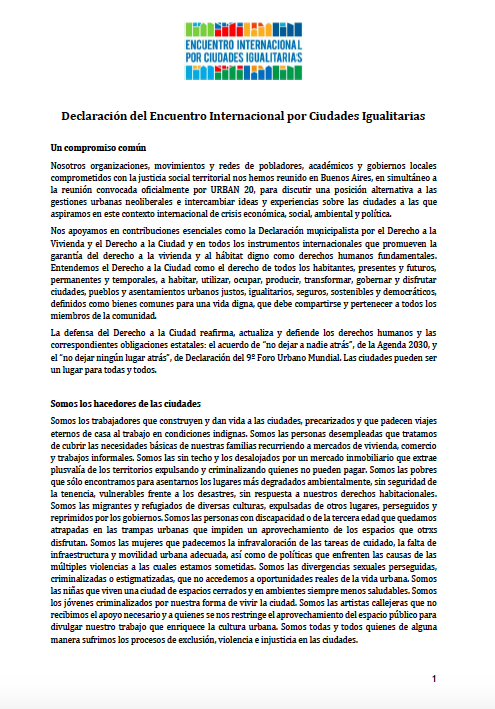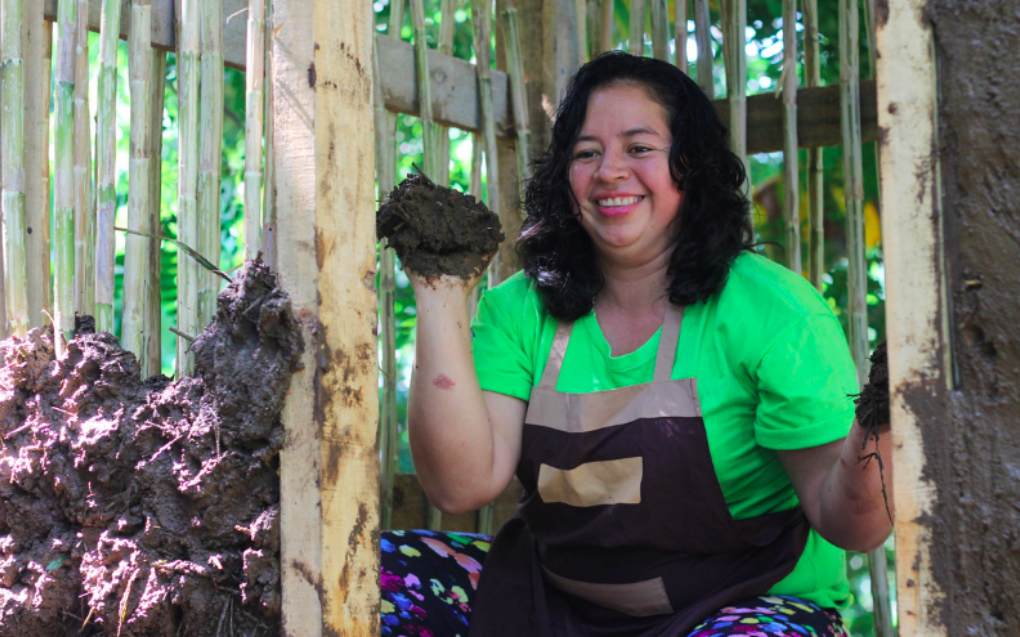DEFINING SOCIAL PRODUCTION
Social production is an international term used
to convey the process and product arising from the experience of people in a
community collectively determining the conditions of their own habitat
(dwelling place and living environment). Social production is found when people
take the initiative to pose solutions to the problems arising from their living
conditions. Partners in social production can be informal groups or local
organizations, and/or other actors external to the community, such as NGOs,
donors, private sector enterprises, professional associations, academics or
government institutions, or any combination of these. Social productions is
usually characterised by a large measure of voluntary action and people’s
agency.
In
economic terms, social production involves people at the community level
relying on themselves collectively to identify, exploit and increase local
capital as assets in the development process. The processes and products of
social production arise despite—or because of—the lack of capital concentration
and take place with the awareness that monetary capital is presently and
increasingly concentrated elsewhere. Therefore, social production processes
depend primarily on community members and partners contributing labour, time,
materials and/or money (usually by savings schemes) existing and available
within the community to produce shared assets in the form of housing,
infrastructure, services, environmental improvements, services or other
benefits that redound to the benefit of the participants.
From
a social perspective, social production is a process (and product) that
identifies, exploits and further develops relationships within the community.
Identifying relationships could mean finding existing collectives of women,
men, students, unionised workers, fisher folk, extended families,
coreligionists, professional associations, etc. that could facilitate the
process of identifying, exploiting or building social capital used in producing
the desired results. The process and outcomes typically bring about social
transformation for the better, enabling a greater degree of participation,
involving each sector in a community on an equitable basis. It sees men, women,
youth, children, elderly, handicapped, minorities cooperating in the planning,
implementation and maintenance of social production.
From
a human rights perspective, social production means collective action to
satisfy human needs and, thus, realize human rights consistent with prevailing
concepts of human dignity and fairness. This essential ingredient is
facilitated by an awareness of rights that the people in the community are
entitled to claim for themselves and others. For example, this could mean
achieving a clean living environment for all; realizing the human right to
adequate housing; claiming and implementing the right to land; producing and
delivering needed food and water; ensuring that housing remains close to
sources of livelihood; ensuring security of person, defending against forced
eviction as a part of a larger solution to housing problems; alternative
planning as a means to assert the right to remain and obtain formal
recognition. Gender equality should a feature of both the means and the ends to
social production.
When
considering the benefits of social production, many other dimensions come into
view, not least of these include the psychological dimension of improved
motivation and self-worth that result; the cultural dimension that reclaims the
rights of the community to express its artistic and expressive production; the
political dimension such that ensures that people exercise their rights to
express themselves and pose participatory alternatives by decision making and
actions the assert the capacity and agency of the community with confidence.
Naturally, of course, the right to development as an individual and collective
need/right is intrinsically linked to the social production process, with or
without the support and participation of government institutions, programs,
policies, budgets, legislations, or other support.
Arising
from the essential human right dimension of the social production process,
States and governments of all forms bear the legal and treaty-bound obligation
to respect, defend, promote and fulfil human rights. These international
minimum standards of statecraft require States to enable social production
through policies, programs, institutions, legislation, budgets and a variety of
services—ranging from legal services, finance, and infrastructure—that
facilitate social production. States and governments of all kinds also hold the
duty to refrain from actions that impede social production, such as forced eviction,
confiscation and repression of human rights (e.g., housing rights) defenders,
discrimination, corruption, withholding of services and other violations.
Social production involves people’s agency to improve living conditions but
does not absolve the State and government of its obligations to citizens and
residents.
The
effects of neoliberal policies and economic globalization include the
privatization of social goods, the concentration of capital in fewer hands, the
withdrawal of States and governments from public service provision, and
ever-deepening poverty. This makes social production an increasingly important
means of struggle. It is seen as a set of strategies that can form part of a
the search for alternative development models on a global level.
HIC
is pooling experiences at social production from all regions of its network, in
order to develop an experiential database and mechanism for exchanging
strategies and experiences among members. Naturally, the most beneficial
examples come to us from regions where social movements already have deep and
long experience at social production and structural change. The “Social
Production of Habitat” Project is designed to serve HIC members in general, but
also to contribute to the social production process and development of social
movements in our region. It will document, analyse and deliver the experiences
of other regions to MENA, but it will also provide an platform for our region
to present and share reciprocally the experience and local genius of our
region.
For
the purposes of this project and in the interest of developing examples of
social movements in our region, HIC is encouraging its members in each region
to propose examples of existing social production experiences that we can share
in the form of a strategic regional meeting to combine and compare experiences,
a published dossier in four languages on the strategic social-production
experiences in five regions, and inter-regional exchanges by representatives of
these experiences in order to share, compare and diffuse the various social
production lessons and potential for increasing people’s agency and problem
solving in their own interest.
For
more information on “Social production of Habitat” and the Habitat
International Coalition’s SPH Project, please contact us:
|
|
|
|
President |
General Secretary |
|
Lorena Zárate |
Ana |
|
|
|
|
Latin America |
Middle East and |
|
María Silvia Emmanuelli |
Joseph Schechla |
|
|
|
|
South Asia Regional Programme |
Housing and Land |
|
Shivani Chaudhry |
Joseph Schechla |




